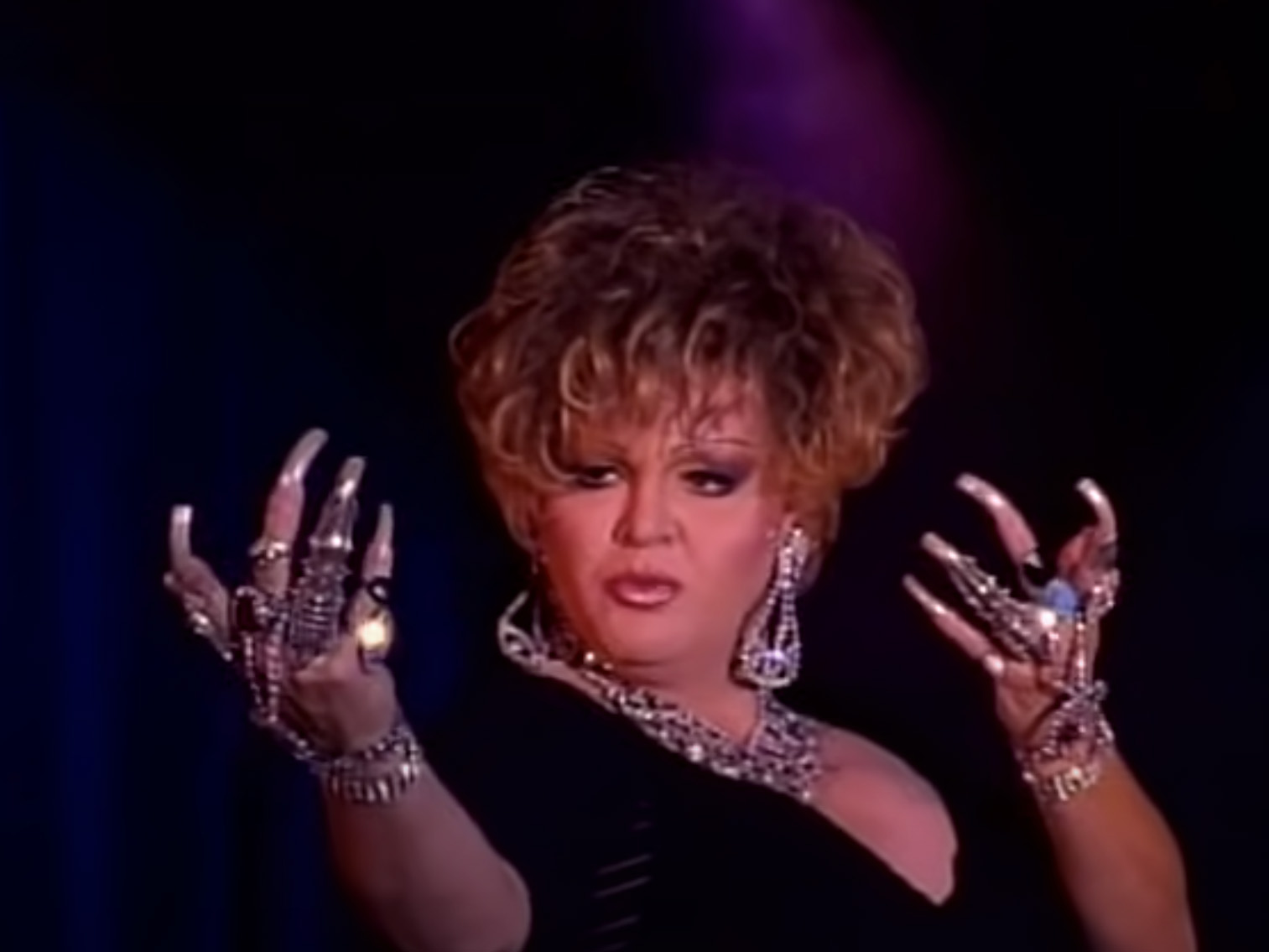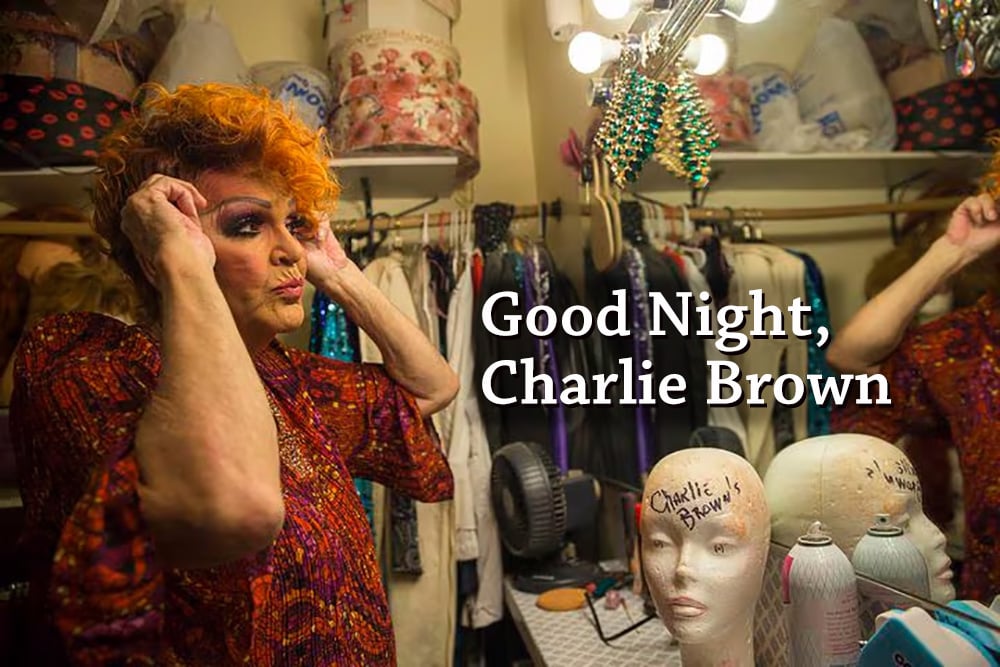Mr. Charlie Brown burst out of rural Tennessee to reign over Atlanta’s drag scene as the ‘Bitch of the South.’
::
People in Atlanta used to party until the sun came up. Until 2004, the city legendarily had bars with 24-hour liquor licenses, and the discotheque Backstreet in Midtown served as the gay Shangri-La for folks who didn’t want the party to end. After going to dinner and after hitting the strip clubs, Atlantans would flock to Backstreet’s Charlie Brown Cabaret and stay until dawn, leaving when the birds were chirping. Eventually, that party would end in 2004 with the closure of Backstreet, the last club to hold onto a 24-hour liquor license.
One thing that never went away was the legendary status of Mr. Charlie Brown. She was the ultimate drag queen, and she taught countless other baby queens the art of drag. She was the self-proclaimed “Bitch of the South” and died at age 74 on March 21, 2024, from complications following heart surgery. For 50 years, Charlie Brown entertained Atlanta like nobody else — mixing jokes with sharp barbs — and helped make the city an epicenter for queer life.
Born Charles H. Dillard in Siloam, Tennessee, in 1949, he spent the first two decades of his life like many other closeted, Southern gay boys. Dillard grew up on a working farm picking fruit, baling hay and skinny dipping with friends (which is when he started to realize he wasn’t like the other boys). After graduating high school, he moved to Nashville to go to business college. Dropping out of college, Dillard realized he was in danger of being drafted into the Army for the Vietnam war. He decided to join the U.S. Air Force in 1969, which seemed a more palatable option compared to the Army. Dillard said in his oral history that he wound up in an all-gay barracks during basic training and would perform campy drag for his fellow nelly soldiers. Dillard never saw combat in Vietnam because he was kicked out of the Air Force for “conduct unbecoming of a soldier.” Within two years, Dillard would be performing drag regularly and on course to change the reputation of LGBT life in Atlanta.

The name “Charlie Brown” was given to Dillard while he was working at a Holiday Inn in Nashville. A co-worker arrived to take over the front desk duties and saw that Dillard had left the check-in system in shambles. He cursed at Dillard saying, “God damn you, Charlie Brown!” The first time Dillard performed drag was in a “turnabout” show (where the bartenders do drag and drag queens tend the bar) at the Watch Your Hat and Coat Saloon in Nashville. Eventually, she became “Mr. Charlie Brown” after a 1970 Nashville city ordinance required female impersonators to identify themselves as male.
In a 2023 editorial for The Tennessean about that state’s newly enacted anti-drag laws, Charlie Brown described how the fear of retribution for performing drag affected queens in Nashville over the decades:
“Way back in 1971, at start of my drag career . . . , we had to enter and leave the club on Second Avenue with our drag concealed in a garbage bag. We were equally careful to enter the club for work as men in our street clothes and to scrub our faces free of makeup before leaving each night,” wrote Charlie Brown. “Otherwise, you could encounter a redneck looking for an excuse to beat up a gay man in a dress. Now, over 50 years later, reading the news coverage of the drag ban in my home state of Tennessee, I feel sick to my stomach. The hate-filled bullies are no longer lurking in the alley waiting to beat us up. In 2023, they work at the state Capitol. They reside in the governor’s mansion.”
Although Charlie Brown wasn’t necessarily looking to escape anti-LGBT hatred in Tennessee, Atlanta’s relative acceptance of queer people was certainly a draw to relocate there. On a trip to Atlanta in 1974, Charlie Brown performed an impromptu drag number at the gay dance club the Sweet Gum Head on Cheshire Bridge Road. She was immediately offered a job performing at the club, and this was the moment that set her on course to become the queen bitch of Atlanta.
At this time, Atlanta was becoming known as the place to be for queer people in the South. Just a few years before, Atlanta experienced its own “Stonewall” moment with the police raid of the Andy Warhol film Lonesome Cowboys, which sparked a revolution in queer life in Atlanta. By the time Charlie Brown moved to the city, Atlanta Pride had been officially launched, and more and more LGBTQ people were coming out and living an openly queer life. Brown would go on to perform drag at many clubs around Atlanta until 1990, when Backstreet brought on Charlie Brown as the headliner of her own cabaret.
“Charlie Brown is my name, and fake pussy is my game. I look like mama, but I’m hung like papaw,” Charlie Brown would say in one of her famous monologues at the cabaret. “And through the course of this show I am going to piss off some of you in some shape, form or fashion. But like I always say here, fuck it. If you can’t laugh at a fat 47-year-old baldheaded man wearing all this bullshit, you don’t have no business out in Atlanta after dark to begin with.”
Atlanta used to be a major party destination. The city was known for its 24-hour clubs, and people (especially queer people) traveled to Atlanta just for its wild times. Over the decades, various clubs like The Limelight (when disco was king) and Club Rio (when punk ruled) put Atlanta on the map as the South’s hedonistic heart. But it was Backstreet, the multifloor, monolithic 24/7 midtown discotheque that reigned supreme from its opening in 1977 to the addition of the Charlie Brown Cabaret in 1990 until its closure in 2004. By many accounts, it was the Charlie Brown Cabaret that made the club famous.

Perhaps what most drew people to the Charlie Brown Cabaret was her ability to “read” the audience members. “Reading” is a slang term for the art of insult done by drag queens in jest for the entertainment of others. Between numbers, Charlie Brown would walk around the room with a microphone in hand. The DJ would play the theme song from Jaws as Charlie wandered the room and casually read the audience members about their looks, about how country they talked, about if they were lesbians with long or short nails, and so forth. Today, this type of drag performance is not so popular, but back in that time, folks would flock to the Charlie Brown Cabaret for a chance to be “read to filth” in front of others.
“People would come from all over the world to Charlie’s show,” said Atlanta drag queen Nicole Paige Brooks in an interview, reflecting on Charlie Brown’s passing. “When the flight attendants had a layover, they came to Charlie Brown’s. All the strippers came after the strip clubs closed. Black, white, everyone was there.”
Brooks (Brian Pryor out of drag) was a long-time friend and colleague to Charlie Brown. In fact, Nicole Paige Brooks credits Charlie Brown with jump starting her drag career. When Brooks was offered a spot in the Charlie Brown Cabaret, Pryor quit his job as a manager at Rich’s department store to pursue drag full time. With the Charlie Brown stamp of approval, the offers to perform flooded in. Nicole Paige Brooks considered the chance to work with Charlie Brown to be a master class in drag.
“Charlie always had the best nails. They were metal nails, like claws! She had armor on her fingers,” said Brooks. “Charlie always had high glamor. Always jewels. Always big hair. But she started out like a little naked showgirl like the rest of us. Her style changed with the time, but she was always a little country sex kitten.”
When asked how Nicole is going to carry on Charlie Brown’s legacy, she pointed out Charlie’s lifetime of community activism, which included decades raising money for people with HIV/AIDS.
“You have to keep being an activist, standing up for what’s right, and raising money for the community that takes care of us,” said Brooks.
Charlie Brown’s Cabaret was one of the last great drag palaces of Atlanta. These are the kind of bars where the drag comes first. Here the stage often takes up half the room, and audiences crowd around with drinks and dollar bills to give to the performers. With the closing of Backstreet in 2004, Atlanta lost the biggest and brightest drag palace it had ever seen.
There have been some drag palaces come and go over the years. After the closure of Backstreet, Charlie Brown opened her own space, Charlie Brown’s Cabaret at Underground Atlanta, for a few years. Charlie Brown also performed at Lips, a dinner-and-a-show drag establishment that caters to tourists, bachelorette parties, and groups. But there was something about Backstreet and the original Charlie Brown Cabaret that could never be recreated. No institution has the same cultural cachet of that original club, and Atlanta’s star has never shone quite as bright as when the city was home to the Backstreet party that never ended.
Today, Future Atlanta in downtown’s Underground has brought the Drag Palace concept back into local nightlife. Local drag impresario Phoenix (Brian Trapp) is the entertainment director of Future Atlanta. Phoenix has been performing for 23 years, and Charlie Brown invited her to have a guest spot in the Cabaret at Backstreet when she was a fresh, new queen.
“Watching Charlie was like watching a magician. She could rip you to shreds and make you laugh at the same time. Her confidence, sense of humor, and smarts are something that every Queen should have. She also was a prime example of how you can be the “Bitch of the South” on stage and be a sweet and kind human off stage,” says Phoenix.
Every party, no matter how grand, must eventually end. Whether that be a nightclub, a moment in our cultural history, or the bright star who brings that party to the people night after night.
“My daddy told me to laugh your way through life. It will go by much easier and much faster. It’s been a good lesson for me. I’ve laughed all the way through my life. And I plan to do it all the way to the grave,” said Charlie Brown in the HBO documentary Dragtime.
Even with all the sadness of seeing a legend like Charlie Brown pass, we can all take solace in the fact that she loved every minute of her time in the spotlight and brought joy to so many people up until her last moments.
::
Matthew Terrell is an assistant professor of media and entertainment in the School of Communications at Kennesaw State University.

